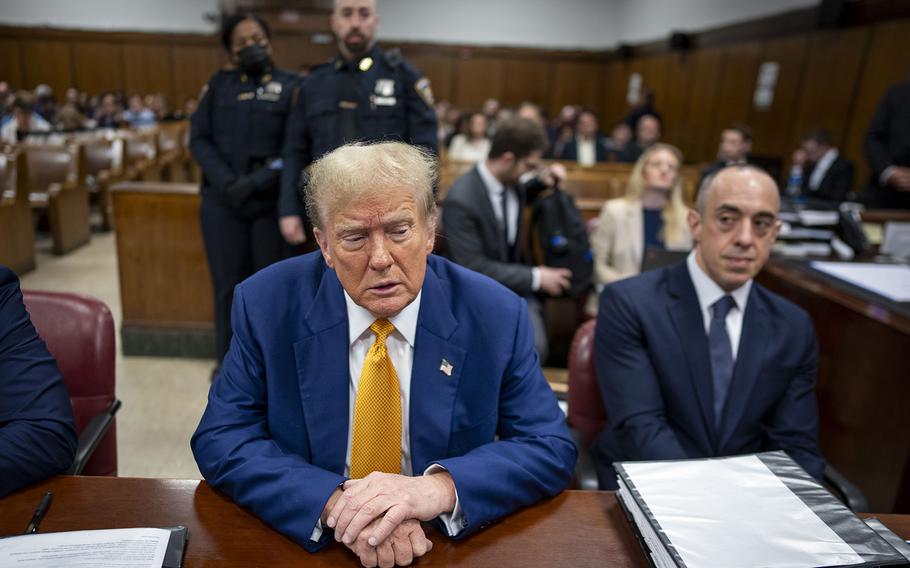U.S.
Defense rests without Trump testifying; focus turns to jury instructions
The Washington Post May 21, 2024

Former U.S. President Donald Trump attends his trial for allegedly covering up hush money payments at Manhattan Criminal Court on May 2, 2024, in New York. (Doug Mills, Pool Photo, Getty Images/TNS)
NEW YORK — Donald Trump’s defense team rested their case Tuesday without calling him to testify, setting the stage for an afternoon hearing where the judge will hammer out legal instructions for a jury that must issue judgment in the first criminal trial of a former U.S. president.
The judge’s charge is an important but often deathly dull part of any trial. The jury is charged by the judge after the members have heard closing arguments, which are scheduled to begin May 28, after the Memorial Day holiday. When that happens, ornate legal framework will describe the legal parameters for the jury to consider whether prosecutors have met their burden of proof to find Trump guilty.
Like reading furniture assembly instructions written in another language, juries often struggle with the dense terminology of a judge’s charge; it is common during deliberations for panels to ask for specific parts of the charge to be read back to them so they can try to better understand the instructions.
In this historic trial, the judge’s charge will be more important than most, because of the legal framework that prosecutors built toward indicting Trump on 34 felony counts of falsifying business records.
Typically, that crime is charged as a misdemeanor, but it can be elevated to a felony if the records were falsified in furtherance of another crime.
Prosecutors argue that the other crime in this case was violating state election law 17-152 — conspiracy to promote or prevent an election. That law makes it a misdemeanor when two or more people “conspire to promote or prevent the election of any person to a public office by unlawful means.”
Prosecutors have said in court that the “unlawful means” at issue in Trump’s case were a violation of federal campaign law — meaning that the charges against the presumptive GOP presidential nominee are really a three-step process.
The key witness against Trump, his former lawyer Michael Cohen, has said he paid $130,000 to adult-film actress Stormy Daniels in October 2016 to prevent her from going public with her claim of a night of sex with Trump years earlier. Cohen says he was reimbursed by Trump the following year in payments disguised as a legal retainer. Those transactions, according to prosecutors, amount to falsified business records.
At the charging conference, the lawyers will debate how best to explain all of this to a jury made up mostly of non-lawyers. The judge’s determinations of the legal threshold for conviction may have a huge impact on what jurors think of the evidence — assuming they can follow the sometimes byzantine nature of charging language.
A jury’s job is to decide the facts, while a judge decides the law. During a trial, those two roles do not mix much — but a charging conference is when the judge formally turns over the case, with a final set of instructions, to the jury.
Trump’s 20th day of trial began Tuesday with more testimony from Robert Costello, whose behavior on the witness stand greatly angered Merchan a day earlier. Once the questioning of Costello ended, defense lawyers rested. They did not call Trump to testify in his own defense, a highly risky legal option that never seemed likely but that Trump teased as a possibility in many of his public diatribes about the trial.
Costello was less confrontational toward the judge on Tuesday, but quickly got testy when a prosecutor suggested he was operating on behalf of Rudy Giuliani and Donald Trump when he gave Cohen legal advice in 2018.
Prosecutor Susan Hoffinger read out an email in which Costello, writing about Cohen, said, “perhaps we have been played here.”
“Do you want me to explain it?” Costello asked.
“No,” Hoffinger replied.
When she asked a follow-up question, Costello replied sarcastically, “Now, you do want me to explain it?”
The defense had called Costello as part of their broader effort to paint Cohen, the most critical witness against Trump, as an untrustworthy liar.
Prosecutors in turn attacked Costello, suggesting he worked in 2018 as a kind of stalking horse for then-President Trump and Giuliani, a longtime personal friend of Costello’s.
Hoffinger pointedly asked Costello if he was trying to exact his own kind of revenge against Cohen after their legal discussions soured.
“You still have a lot of animosity against Michael Cohen don’t you?” she asked. Costello denied that he did.
She then noted that he testified last week to the House of Representatives about Cohen, at the time that Cohen was testifying in Trump’s trial.
“It was an effort by you to intimidate Michael Cohen?” Hoffinger asked.
“Ridiculous, no,” Costello answered.
Trump lawyer Emil Bove finished up the evidentiary portion of the trial by asking questions aimed at showing that Costello, like most everyone else who dealt with Cohen, found him to be an erratic and unbelievable hothead.
“Did you ever pressure Michael Cohen to do anything?” Bove asked.
“I did not,” Costello replied.
“Did you ever have control over Michael Cohen?” Bove asked.
“Completely not,” Costello said.